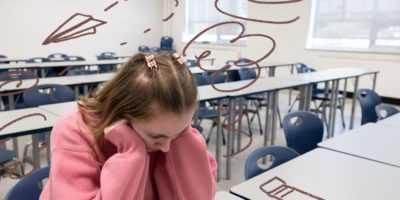by Kerry Wall
Online Editor
The United States government’s response to Hurricane Katrina was a rude awakening for the public, a panel told a public forum at Ryerson last Wednesday.
“It lifted the mask of the brutal racialization in the U.S.,” said Judy Rebick, Ryerson’s CAW-Sam Gindin Chair in Social Justice and Democracy. “The media coverage showed the underbelly of class and race in the United States and it caused a lot of people trauma.”
Warren Crichlow, an associate professor at York University’s Faculty of Education, agreed and said people were shocked by the hurricane and its aftermath because they were not aware of existing circumstances.
“Perhaps Canadians have not driven through Louisiana,” he said. “If they had, they would not be surprised by the devastation hitting black people after Katrina.”
Rebick and Crichlow were joined on the panel by David Morley, a former executive director of Doctors Without Borders and Norman Richmond, producer of Saturday Morning Live on CKLN.
RSU president Rebecca Rose asked the panel about a mass-circulated email detailing bias in media reports. Photographed people were described as either “finding” or “looting” items, she said, adding that race seemed to determine which caption was used.
Crichlow said it was refreshing to see the Internet and alternative press “working to inform people about those kinds of biases.”
The U.S. government’s response was “so slow and inadequate that even CNN had to recognize it,” Rebick said.
Morley blamed biased Katrina coverage on media’s preoccupation with innocence.
“We saw what years of racism and oppression did to the people of New Orleans,” he said. “It’s why the desperation (alleged looting and violence) is not seen as innocent.”
The forum also focused on Katrina’s impact on culture in the southern U.S. A jazz quartet paid tribute to the music of New Orleans before discussion began.
Richmond said it may be hard for artists to regroup in the wake of Katrina’s devastation.
“The Neville Brothers’ and the Master Ps, they’ll be all right,” he said. “But the average working-class black person may not be able to return (home).”
Crichlow spoke out against a plan to remove 70 per cent of the black population from New Orleans, saying it would prevent the rebuilding of the city’s culture.
“It’s very important to bring them back,” he said. “If they’re not there, there’s no way to avoid a corporate rebuilding of the city, with condos and apartments.”
The RSU plans to hold a pub night on Oct. 18 as a fundraiser and celebration of the city’s culture.
Moderator Liz Diaz, an RSU community services director, said she was pleased with the turnout to the forum and would like to see students get involved in related events.
“It’s great to see so many people interested in such an event, especially in a community as diverse as Ryerson,” she said.











Leave a Reply